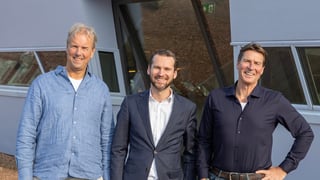Anyone who arrives at the parking area in a car with an internal combustion engine (you probably know them as gasoline or diesel powered cars) at our office in Noordwijk, will have to settle for a second rate parking space. Electric cars park at the entrance; noisy cars that pollute the environment will have to park a little further away. Is this silly or childish? I would rather say: welcome to the future.
Number of electric cars is growing
Anyone who is surprised at that, has had their head stuck in the sand for the past few years. The number of electric cars in the Netherlands (all-electric and hybrid) has quadrupled over the past three years. Volvo will only introduce electric cars starting in 2019. Volkswagen is getting rid of its old models and replacing them with new, electric ones. And you are still surprised that the old gasoline or diesel powered car is slowly becoming an undesirable alien?
We have already started working on it at Decos. There is no longer room in our fleet for cars that are powered by fossil fuels: as a company that wants to provide a future for tomorrow’s world, we have an all-electric company car leasing policy. Out of the 41 cars in our fleet, 38 of them are electric or hybrid; the remaining three diesel and gasoline powered cars will be phased out quickly. Next year, our fleet will have twelve all-electric cars, including Nissan Leafs, BMW i3’s, Hyundai Ioniqs and Tesla (X and S). The plug-in hybrids will also be replaced by electric models once those contracts expire. Thanks to these steps, we will have an all-electric fleet in three years.
I can assure you that it’s not only sustainable, it is also really fun! The electric car is just like the invention of the telephone and television: people will first laugh at it (“I’m never going to drive one of those”), then a little while later, we won’t be able to live without one. The time of noisy engines that pollute the environment may be a thing of the past, but it won’t be missed. People who start driving an electric car never want to go back to the old way.
Distance
I often have amusing discussions about this topic with other entrepreneurs. Some of them see many obstacles: electric cars are expensive to buy, the subsidy policy doesn’t have enough reach or the cars cannot travel far on a charge. Luckily at Decos we came up with the Cartracker (a trip registration system) and it has proven its worth here once again.
Our entire fleet is equipped with these Cartrackers to register our business trips. The data shows us that as a company, we have taken 51,000 trips each year, and only 714 of them were further than 150 kilometers. If we only look at the business trips, that number is less than half: 345, which is a total of 0.7 percent of our total number of trips. With 41 cars, this means that a stop had to be made at a fast-charging station eight times a year on average: that is only once in six weeks! Also take into consideration that the minimum distance for many models is a lot higher than 150 kilometers.
Old world
As a company that runs on natural energy and is fully paperless, the only thing that stood in our way of being fully sustainable in our work was the CO2 emissions of our fleet. We have taken that step now. And if we can do it, other companies can do it too. More importantly: if we can already do it today, it should be no problem for it to be done worldwide within the next ten years – an additional (temporary) stimulus from governments is also welcome for the desired flywheel effect.
According to the newspapers, all of us can drive electric cars in 2040. I am more optimistic than that: fossil-fueled cars will be a thing of the past within ten years. Some people think that is a shame, but they are still living in the old world. They haven’t experienced the joy of accelerating quickly, a silent engine and – upon arriving at the office – being able to park at the entrance. The parking area in the back of our offices in Noordwijk is becoming more empty by the day.

Written by
Paul Veger
Posted on
8 September 2017








